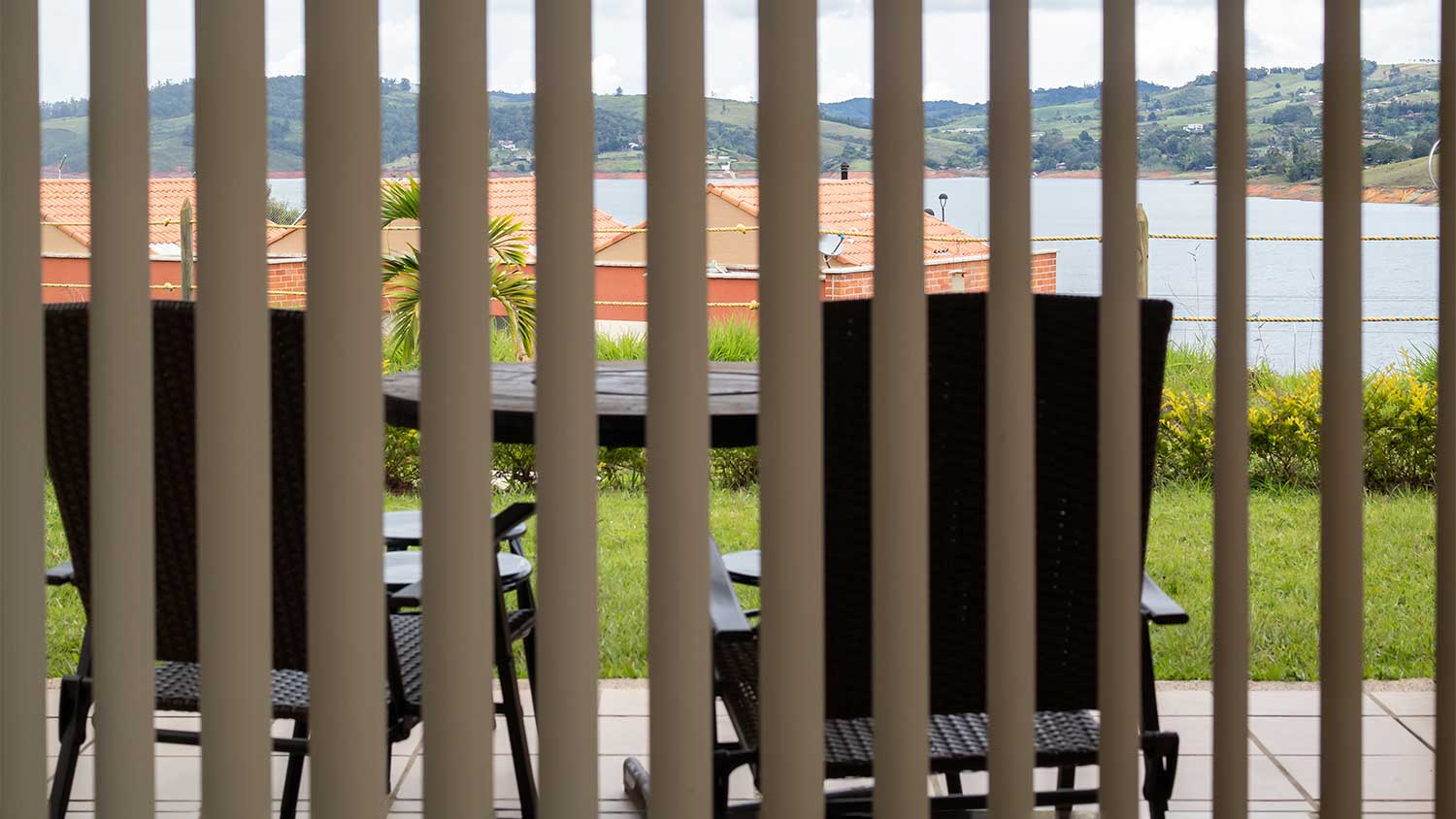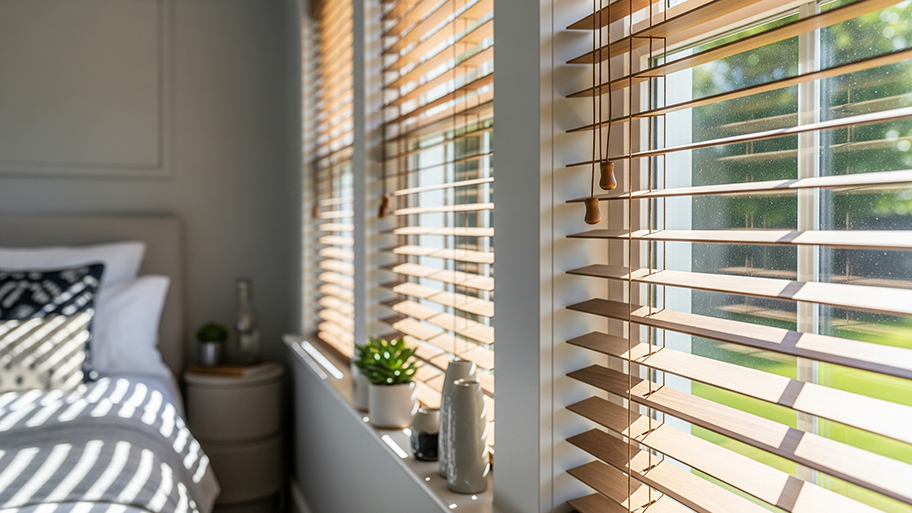
Estate shutters can add a stately appearance to your home and block out light. Learn how much estate shutters cost, depending on window size and material.
On average, blinds installation in Indianapolis costs $809, with most homeowners paying between $220 and $1,425. Your final price will depend on the number of windows, the type of blinds, and the complexity of the installation.


Blinds in Indianapolis need to handle all four seasons, offering moisture resistance and insulation.
Faux wood, cellular, and aluminum blinds are top picks for Indiana’s changing weather.
New blinds can cost as little as $26 per window, with custom or smart blinds reaching $600 or more.
Based on size and mounting surface, labor runs $100 to $300 per window.
Blinds may not boost resale, but they improve efficiency, privacy, and curb appeal.
Installing blinds on your windows in Indianapolis, Indiana, costs around $809, though your final total will vary. Most homeowners spend between $220 and $1,425, depending on the number of windows, the type of blinds, and any installation challenges.
Indianapolis’ hot, humid summers and cold, snowy winters make installing blinds that can handle wide temperature swings crucial. Some styles and materials are better at resisting moisture, while others offer extra insulation to boost energy efficiency. These functional needs can influence both your design choices and overall installation costs.
One of the most important things to consider when choosing blinds is your local climate, and in Indianapolis, Indiana, that means planning for all four seasons. You’ll want blinds that offer practical year-round performance, such as insulation in the cold and UV protection during the heat.
When measuring for blinds, it is essential to know that size directly affects cost. Larger blinds require more materials and may need custom solutions, which are often necessary for bay windows, raising the total price. Here are the standard window sizes in and around Indianapolis.
| Size of Window (Inches) | Price Range (All-In) |
|---|---|
| 24 x 36 | $45–$140 |
| 24 x 48 | $55–$170 |
| 36 x 48 | $75–$230 |
| 36 x 72 | $110–$320 |
| 60 x 72 | $170–$500 |

The style of blinds you choose affects more than aesthetics; it also shapes how your space functions and how much you’ll spend. Some styles are known for energy efficiency, others for convenience or modern appeal.
Consider cellular or Roman shades if you live in one of Indianapolis’ century-old Craftsman-style bungalows. Cellular blinds provide energy efficiency for all four seasons, while Roman shades offer a soft, classic look that complements traditional wood trim and built-ins.
| Blind Type | Top Feature | Average Cost |
|---|---|---|
| Mini | Narrow slats | $20–$140 |
| Cordless | Tangle-free, safer | $30–$330 |
| Roller | Simple, space-saving | $25–$350 |
| Vertical | Ideal for tall windows | $65–$350 |
| Venetian | Classic light control | $26–$400 |
| Cellular | Energy-efficient design | $65–$380 |
| Roman | Soft, elegant folds | $65–$400 |
| Custom | Made-to-fit | $65–$650 |
| Motorized or electric | Remote or smart control | $400–$600 |
| Bay | Fits angled bay windows | $165–$550 |
| Vertical, Sliding Glass Door | Covers wide openings | $135–$650 |
In Indianapolis, where homes range from historic bungalows to new builds, blinds should balance style with year-round function. Vinyl blinds, starting at an affordable $26 each, come in various styles, including faux wood, and hold up well to humidity and drafts. Natural wood and leather add elegance but need extra care. Bonded polyester shades, aka cellular, offer insulation to help cut energy costs in the city’s extreme seasons.
An Indianapolis blinds installer can guide you through the best type and material for your specific needs and budget.
| Material | Features | Price |
|---|---|---|
| Bonded polyester | Insulates, saves energy | $60–$380 |
| Plastic | Moisture-resistant | $35–$150 |
| Faux wood | Moisture-resistant | $45–$250 |
| Aluminum | Durable, reflects heat | $40–$180 |
| Bamboo | Sustainable, eco-friendly | $45–$200 |
| Fabric | Aesthetic, insulates | $65–$250 |
| Vinyl | Affordable, durable | $26–$300 |
| Leather | Elegant, some insulation | $90–$350 |
| Wood | Eco-friendly, moisture-prone | $45–$350 |
In a four-season climate like Indianapolis, blinds last seven to 10 years with regular use. Still, that lifespan depends on the material, sun exposure, humidity, and how often you open and close them.
Vinyl or aluminum blinds usually need replacing every six to eight years, while cellular shades last seven to 10 years. Wood blinds can last over 10 years with proper care, but are more sensitive to humidity. Fabric shades have a shorter lifespan of five to seven years, as they can fade or trap moisture. You will know it is time to update if you notice any of these signs:
Warping, cracking, or fading
Difficulty raising or lowering
Dust and grime that won’t come clean
Poor energy performance (especially for insulating shades)
In Indianapolis, professional blinds installation costs depend on the number and size of windows, the type of mounting surface, like drywall, tile, or brick, and whether the blinds are installed inside or outside the window frame. While permits usually aren’t required, complex installations or hard-to-reach windows can increase labor time and overall cost.
In Indianapolis, labor for blinds installation often ranges from $100 to $300 per window, depending on the project's complexity and the type of blinds. For a standard-sized home with around eight windows, you can expect a total cost of $600 to $1,200, factoring in potential bulk discounts on labor.
Blinds installation is subject to Indiana’s statewide sales tax rate of 7%. The state doesn’t charge additional local sales taxes, so you won’t see extra city or county fees added. Your pro will build tax into their estimate, but if you purchase blinds at a retailer, be sure to factor sales tax into your budget.
Tipping your blinds installers isn’t expected, but it’s deeply appreciated, especially if they did a stellar job from installation to clean up. A standard guideline is to tip around 10% to 20% of the total cost. If cash tipping isn't feasible, a thoughtful gesture like offering bottled water, snacks, or leaving a glowing online review can go a long way in showing your thanks.
Installing window blinds doesn't offer a direct return on investment (ROI) like major renovations might, but it adds value in other meaningful ways.
Blinds improve privacy, boost energy efficiency by regulating indoor temperatures, and enhance overall comfort, benefits that many homeowners consider priceless. Well-chosen, modern blinds can also make a home feel more polished and move-in ready, which may appeal to buyers even if it doesn't significantly raise resale value.
Home is the most important place on earth, which is why Angi has helped more than 150 million homeowners transform their houses into homes they adore. To help homeowners with their next project, Angi provides readers with the most accurate cost data and upholds strict editorial standards. We survey real Angi customers about their project costs to develop the pricing data you see, so you can make the best decisions for you and your home. We pair this data with research from reputable sources, including the U.S. Bureau of Labor Statistics, academic journals, market studies, and interviews with industry experts—all to ensure our prices reflect real-world projects.
Want to help us improve our cost data? Send us a recent project quote to [email protected]. Quotes and personal information will not be shared publicly.
From average costs to expert advice, get all the answers you need to get your job done.

Estate shutters can add a stately appearance to your home and block out light. Learn how much estate shutters cost, depending on window size and material.

Discover the average window treatment cost, including price ranges and key factors, to help you plan your project with confidence.

There are a few common problems with vertical blinds you may run into as your window treatments age. Here’s what you can do about them.

Looking to buy custom window treatments or just looking for window treatment ideas? This home interiors expert shares 12 common types of window treatments.

Damaged blinds are an eyesore and a pain to open and close. Learn how to fix broken blinds in just minutes with this helpful guide.

The differences between light-filtering and room-darkening window treatments are subtle but important. We’re sharing their pros and cons, how they complement your home and help you save on energy costs.